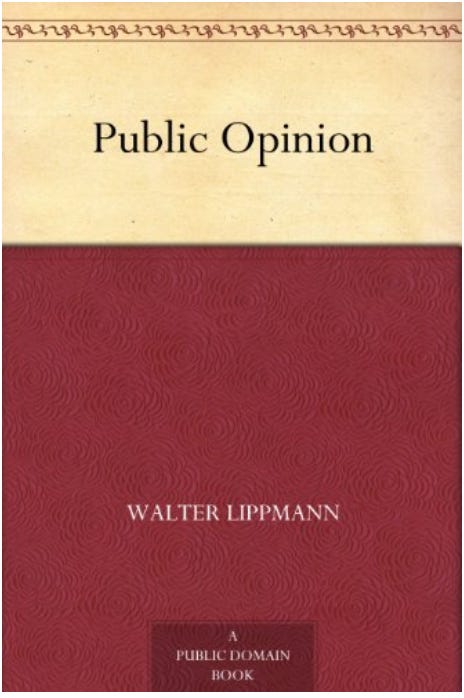In 1922 Walter Lippman outlined an abstract problem about how modern democracies can fail. Today that abstraction is a reality. Yet, as we struggle with the very same problem Lippman’s seminal book “Public Opinion” tackled, little attention is given today about his observation and the debate it created last century.
In an increasingly complex society, Lippmann observed, voters no longer have first-hand experience with the various issues facing modern democracies. Instead, voters had to rely on the media (which in 1922 was basically newspapers, magazines and early newsreels) to learn about complex or distant issues when making decisions at the ballot box. But what if different media outlets reported events differently because of intentional or unintentional bias? Voters reading different versions of the same event would have different versions of the truth. Without a common understanding of “truth”, democracies would not be able to function, Lippman wrote a century ago.
Sounds very much like the consequences of the media bubbles that surround most Americans today.
Lippman’s democratic dilemma sparked a measured “debate” to address this problem. Philosopher John Dewey viewed democracy—even with all its shortcomings—as the cornerstone of an idealized society. Dewey recognized the validity of Lippman’s concern, and he offered up a very Jeffersonian solution. A modern democracy must educate and empower citizens with the basic skills of democratic citizenship. Dewey believed that citizens cannot be passive; democracy requires some level of work—beyond voting—for citizens to make sound voting decisions. Dewey was not naïve about how easy it was to manipulate voters, but he believed that by creating a cultural of democracy—where citizens themselves debated and deliberated policy issues--citizens could vet and inoculate themselves from bias or misinformation.
Lippman was more skeptical of the masses, so he offered up a social construct that required none of the civic investments Dewey’s strategy required and was workable in the low-tech and relatively homogenous United States of the mid-20th century. He outlined a system in which the two competing parties and their ideological allies were composed of technocrat elites who would rotate in and out of office, depending on which party was in power. Journalists were a key part of this model. They would be the technocrats that provided “objective” reporting on the issues of the day, earning Lippman the moniker “Father of Modern Journalism”. But in Lippman’s vision, the role of the citizen was simple: if you were happy, vote to keep a party in power and vice versa. No democratic skills required.
Lippman’s imperfect system of “manufactured consent” worked well until the lies of the elites (think Vietnam, Watergate and Weapons of Mass Destruction) and their economic policies devastated middle America; or until the the TV network monopoly was usurped by the smart phone. As a result, our elite politicians and journalists are no longer trusted, and the legitimacy they once held has been filled by babbling idiots on the internet.
Which brings us back to the Lippman Dewey debate a century ago and the question they struggled with: how does our democracy develop the bond of a common truth? Today that challenge is exponentially more complex, given current technology AND a demographic shift into a majority-minority country. Lippman’s model worked in simpler times, when technology required an intermediary—the “disgraced” media elites of today—for information to reach voters. But today, we are all the media. Every one of us can offer a falsehood and claim it to be true.
With this new reality, Dewey’s vision of building a culture of democracy in the country—one that inspires the hard work needed for citizens to take an active role in our democracy—is an idea that needs to be revisited. Because today, Lippman’s docile and uninformed voter is now “the media”, rejecting established media institutions and setting up a newsletter for all to read. (Not that there’s anything wrong with that!) And that Genie is not going back in the bottle.
John Dewey’s Jeffersonian idea to inspire a cultural of individual civic engagement in this country, where people strive to discern truth rather than score points, is the “break the glass” solution needed to save our Republic in the 21st Century. But this is not a mere call to “teach more civics”, but will require a level of resources on par with walking on the moon. In future articles we will explore the need and feasibility of developing a REAL culture of democracy in the US.





Kevin this is an excellent piece. I am with a thoroughly Deweyan project for developing a deeper culture of democracy in the country through a "a national transformative civic educational system." Would love to hear your comments.
The Growing Democracy Project, https://growingdemocracyproject.org/